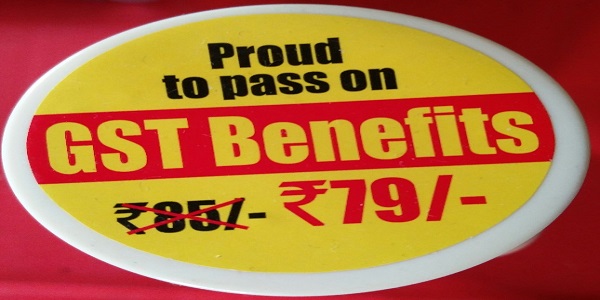Anti-profiteering is introduced in the GST Act based on the experience gained at the time of implementation of VAT in India and all other countries where GST / VAT is rolled out. The Government across the nations felt that the until and unless there is a provision in the law the benefits of the new tax regime are not being passed.
The benefit of the ITC is clearly evident in the MRP based goods, the prices are fixed based on the assumption that in the erstwhile tax regime Central Excise Taxes are not eligible for Input Tax Credit but with GST all the taxes are eligible for the ITC across the supply chain cycle, this means that ITC on the taxes can be claimed at all stages of supply. Say for example, Central Excise taxes were not eligible for ITC by the wholesaler or distributor or the end retailer, therefore Central Excise duties were part of the MRP but in GST, all the taxes are eligible for ITC, so the MRP’s have to revisited and reduced accordingly. Recently we have seen a case where one of the major FMCG company has not passed on the rate reduction, the company has paid Rs 119 crores as fine.
It is really a herculean task but not an impossible task to determine the reduction of the cost on account of additional ITC in the supply chain, reduction of taxes and taxes subsumed in GST. Many of the taxpayers are of the assumption that there is no change in the pricing as they were taking ITC in the erstwhile tax regime and now also, but they have to look beyond then only come to a conclusion. The reduction in the MRP can be used and widely publicized as in the Australian Model where it is required to show the pre-GST and post GST Prices. Though display of dual MRP is not a mandatory feature in GST, the same can be used and shown predominantly on the goods. Adhering to the provisions of the anti-profiteering is also part of the corporate governance.
Let me explain the same with a small illustration practically A Ltd and B Ltd are two manufacturers of a health dink brands H and I. A decided to reduce the price of the product H and use the Australian Model of dual GST and whereas B Ltd has not reduced the price as it did not consider the same to be required. In the departmental stores both the brands H & I are placed in the same rack. When the customers walk in to buy the health drink, he is attracted to brand H as he says the price is being reduced and also following the compliance even though he is using the brand I for a long time. The loyalty of the customer shifts from the brand I to brand H of company A Ltd.

This is one of the products I have seen in the departmental store for the reduction of the GST, this is how this company is publicizing the price reduction.
It is a known fact that cost of acquisition the customer is very high and retaining the customer is also high. Here the cost benefit analysis is also not required as it is a statutory obligation and also as part of the corporate governance it has to adhered.
Anti-profiteering as seen is not anti-business but it can be used as a tool to improve the market share and profitability on account of volumes and lesser spend on the marketing costs. This benefit is available only for the corporates who act proactively and the early adopters.
It is known to all that the Director General of Safeguards has issued notices to companies and the investigation is in under process. In today’s dynamic world any negative news on the brand or the company will have an immediate impact on the sales and could also impact the profitability as well as the market capitalization if listed in the exchanges.
As part of the corporate governance and statutory obligations in the GST Act, any reduction in the rates or the availability of the Input Tax Credit has to be passed to the end customer.
The author can be reached for any further clarifications on the same on the mail id mallikarjunagupta@india-gst.in
Any views or opinions represented above are personal and belong solely to the author and do not represent those of people, institutions or organizations that the owner may or may not be associated with in professional or personal capacity, unless explicitly stated. Any views or opinions are not intended to malign any religion, ethnic group, club, organization, company, or individual.





